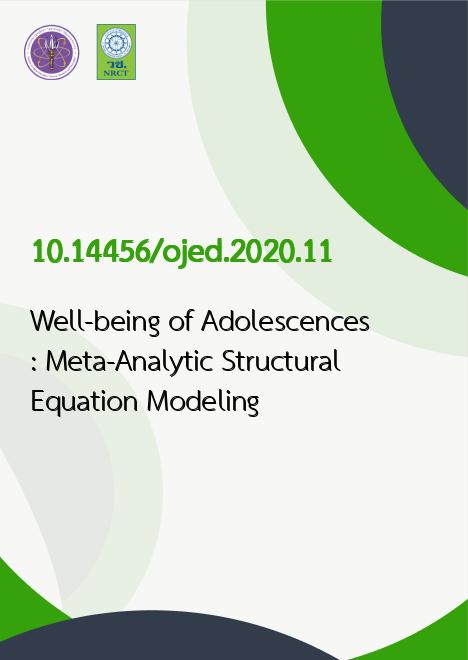
|
Well-being of Adolescences: Meta-Analytic Structural Equation Modeling |
|---|---|
| รหัสดีโอไอ | |
| Creator | Nattika Jaroentaku |
| Title | Well-being of Adolescences: Meta-Analytic Structural Equation Modeling |
| Contributor | Surasak Kao-iean |
| Publisher | Centre for Education Innovation, Print and Online Media |
| Publication Year | 2563 |
| Journal Title | An Online Journal of Education, Chulalongkorn University |
| Journal Vol. | 15 |
| Journal No. | 2 |
| Page no. | OJED1502004 (13 pages) |
| Keyword | well-being, emotional intelligence, gratitude, coping style, social support, meta-analytic structural equation modeling |
| URL Website | https://so01.tci-thaijo.org/index.php/OJED |
| Website title | An Online Journal of Education, Chulalongkorn University |
| ISSN | ISSN 1905-4491 (Online) |
| Abstract | This study aimed 1) to study the difference of effect size based on research characteristics, and 2) to study mediating effects and to verify the validity of a structural equation model with respect to the emotional intelligence, gratitude, coping and social support effects on the well-being of adolescents. The 67 samples in this study were drawn from 100 research studies published from 2007 to 2019. MASEM was applied using R and MPlus for data analysis.The results of the study are as follows: 1) The research characteristics, consisting of publishing, content and research methodology, had significant impact on the effect size of factors which affect well-being, at a .05 level of significance. 2) The total effects of emotional intelligence, social support, coping style and gratitude directly affected well-being of adolescents at .213, .141, .116 and .105 respectively. 3) Emotional intelligence and gratitude affected indirectly and significantly on adolescents’ well-being through coping style and social support at a .05 level of significance. 4) Emotional intelligence, gratitude, coping style, and social support were able to explain the variation of adolescents’ well-being, accounting for 18.3%; as additionally, the model was fitted to the empirical dataThis study aimed 1) to study the difference of effect size based on research characteristics, and 2) to study mediating effects and to verify the validity of a structural equation model with respect to the emotional intelligence, gratitude, coping and social support effects on the well-being of adolescents. The 67 samples in this study were drawn from 100 research studies published from 2007 to 2019. MASEM was applied using R and MPlus for data analysis.The results of the study are as follows: 1) The research characteristics, consisting of publishing, content and research methodology, had significant impact on the effect size of factors which affect well-being, at a .05 level of significance. 2) The total effects of emotional intelligence, social support, coping style and gratitude directly affected well-being of adolescents at .213, .141, .116 and .105 respectively. 3) Emotional intelligence and gratitude affected indirectly and significantly on adolescents’ well-being through coping style and social support at a .05 level of significance. 4) Emotional intelligence, gratitude, coping style, and social support were able to explain the variation of adolescents’ well-being, accounting for 18.3%; as additionally, the model was fitted to the empirical data ( ?2= 2.518, df = 1, p-value = .113, CFI = 1.000, RMSEA = .006) |